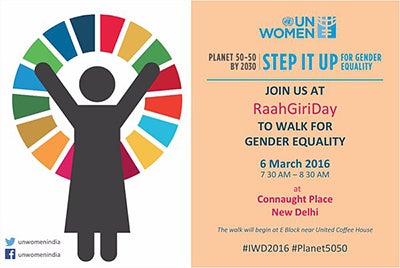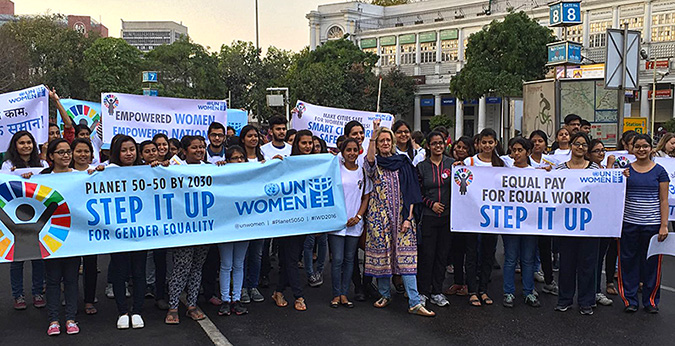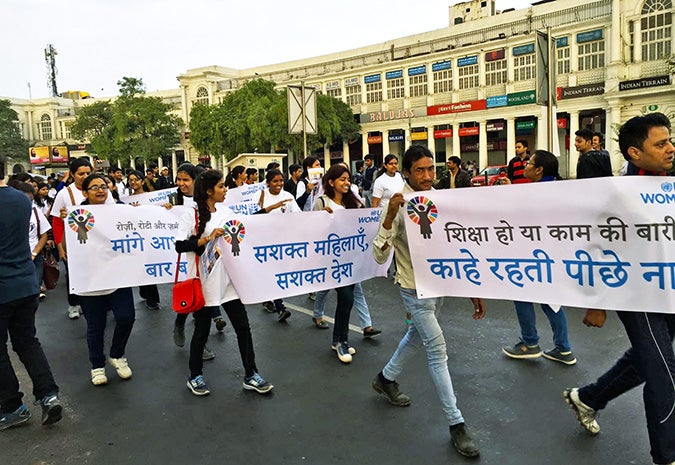UN Women, youth ‘Step It Up’ for gender equality at Raahgiri
Date:
New Delhi, India – Ahead of International Women’s Day on 8 March, UN Women Office for India, Bhutan, Maldives and Sri Lanka today organised a ‘Step It Up’ walk for gender equality at Raahgiri at Connaught Place in New Delhi. The early morning rain did little to dampen the enthusiasm of the hundreds of people – activists, youth, students and visitors who had converged on the traffic-free zone in central Delhi to join the walk.

The call for “Planet 50:50 – let’s ‘Step It Up’ for gender equality!” resounded throughout the march, drawing the attention of other visitors who also joined in. Walkers carried banners with messages that called for equal work for equal pay, an end to violence against women and ‘Safe Cities’ for women and girls.
Planet 50-50 by 2030: Step It Up for Gender Equality is the theme for International Women’s Day 2016. The United Nations observance on 8 March will reflect on how to accelerate the 2030 Agenda, building momentum for the effective implementation of the new Sustainable Development Goals. It will equally focus on new commitments under UN Women’s Step It Up initiative, and other existing commitments on gender equality, women’s empowerment and women’s human rights.

“We’re asking governments to make concrete commitments to achieve the gender targets in the Sustainable Development Goals so that we can create an equal planet, Planet 50:50, by the year 2030,” said UN Women Representative Dr. Rebecca Reichmann Tavares. “These targets include ending violence against women, recognising the unpaid care work that women do, full and equal participation of women in political and economic decision-making, and equal rights to land and economic resources, among others.”
“Your support is essential!” Dr Tavares said to the energetic gathering at Connaught Place. “We count on you to take this message to elected representatives, policymakers, schools and colleges. I am delighted to also see so many men and boys here today – you’re setting an example by showing that gender equality is not a women’s issue – it involves all of us.”

International Women’s Day’s activities are shaped so as to urge implementation of national commitments to gender equality and women’s empowerment. So far, 90 governments have committed under our 2015 call to action to governments to “Step It Up”, and all remaining governments are being encouraged to join the ‘Step It Up’ initiative. The call is expected to create global momentum towards the realization of Agenda 2030 for Sustainable Development and create space for public advocacy at the national level to encourage the implementation of the Sustainable Development Goals.
“This amazing chanting of ‘Step It Up for Planet 50-50’ was about young people sending a message to everyone everywhere, asking for an end to gender inequality by 2030,” said Planet 50-50 champion and youth advocate Saket Mani who also participated in the walk. “I want to live in a world where gender is no longer a form to discrimination and feminism is embraced by all genders.”
The public events will continue to be the signature public advocacy activity on and around International Women’s Day leading up to 2030 – the deadline for the Sustainable Development Goals.
For more information
Please contact: Rineeta Naik
Communications Analyst, UN Women India
Tel: +95 605 97782
E-mail: [ Click to reveal ]
About International Women’s Day
The United Nations began celebrating International Women’s Day (IWD) on 8 March during International Women’s Year 1975. Two years later, in December 1977, the General Assembly adopted a resolution proclaiming a United Nations Day for Women’s Rights and International Peace to be observed on any day of the year by Member States, in accordance with their historical and national traditions.
International Women’s Day first emerged from the activities of labour movements at the turn of the twentieth century in North America and across Europe. Since those early years, International Women’s Day has assumed a new global dimension for women in developed and developing countries alike. The growing international women’s movement, which has been strengthened by four global United Nations women’s conferences, has helped make the commemoration a rallying point to build support for women’s rights and participation in the political and economic arenas.
Increasingly, International Women’s Day is a time to reflect on progress made, to call for change and to celebrate acts of courage and determination by ordinary women who have played an extraordinary role in the history of their countries and communities.